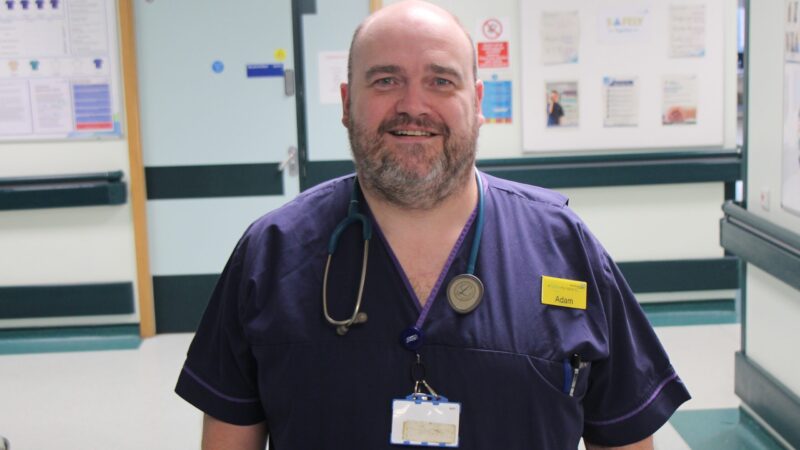
After 25 years working in retail, Adam Breen took a detour in life and decided to change his career for something more meaningful.
After completing his nursing degree seven years ago, Adam, now 51 from Ingleby Barwick, has worked his way up the ranks to become a nurse practitioner. He has worked in the emergency assessment unit (EAU) at the University Hospital of North Tees for over seven years now.
We sat down with Adam to find out a little more about his career change and what his role in EAU involves.
Come along to our EAU recruitment day
Our EAU team is hosting a recruitment day to aspiring or current nurses to find out more about the service and the career options it holds.
Date: Friday 10 May
Time: Drop in at any time between 10am and 1pm
Venue: Room 4, Middlefield Centre, University Hospital of North Tees
What led you to become a nurse on EAU?
I worked in various retail spaces since leaving higher education, including 15 years as an award-winning shop manager. Ten years ago, I decided to make a detour in my career and started my degree in nursing.
As a third year student, I spend three months on placement in the emergency assessment unit. During this time, I was offered a job as a newly qualified nurse. The intention was to get a grounding on EAU and then move into a different area.
I’ve been a qualified nurse for seven years now – all seven on EAU.
How was the move from retail to nursing?
It might seem like a drastic change in career but at the end of the day, both my careers have been a point of service – people who were once called customers are now called patients. Both have a need, you ask questions, you find a solution and then you provide them with that solution.
If both are done in an engaging and empathetic way, outcomes are ultimately positive and the patient (or customer) has a good experience.
The skills I gained in my retail roles certainly helped me as a mature student and as a nurse.
Life experiences give you an ability to approach a situation with the right attitude, the right language and the right tone. As a salesperson and manager of people, you learn how to read a person and you can empathise with people – whether that’s a grief-stricken family member or discharging a heated exchange.
One of the greatest skills I have brought from my time in retail is the ability to quickly build rapport with people, building trust and the ability to identify needs through questioning techniques.
What does your role as nurse practitioner on EAU involve?
My role is really multifunctional – it’s a bridging gap between the nursing staff and the doctors.
My main role is to clerk patients, mainly in the initial assessment area. We take patients from local GP practices, the ambulance service, NHS 111 and our colleagues over in urgent care. My role is to assess each patient, provide an impression to a senior doctor, then qualify the patient for discharge, outpatient treatment or admit them for treatment as a hospital inpatient.
But I also see my role as a senior point of contact. I’m a role model, a resource and a source of help and support to any member of the EAU team.
What’s a shift on EAU like?
Shifts are a typical eleven-and-a-half-hour day or night. It starts at either 9am or 9pm, with a handover from the previous shift where we’ll discuss patients who have been poorly over the last 12 hours. This gives everyone an understanding of each patient’s needs in EAU.
Handovers are usually quite detailed because we’ve got a capacity of 60 beds, plus two assessment areas.
I spend most of my time in the assessment units, giving primary assessments for patients and making decisions on whether they need to stay and be admitted for further treatment or if they can be discharged and arrangements made for them to go home.
Part of a patient’s treatment may involve discussing plans and seeking additional support from other specialties in the Trust or other organisations.
As a nurse practitioner, I do various roles on the ward so this list isn’t exhaustive, but other tasks include:
- Supporting senior doctors with procedures
- Prescribing medications
- Reviewing scans in clinic
- Provide ancillary services – such as venepuncture or cannulation
What do you love about working on EAU?
I’ll rewind to 12 years ago when I decided to change my career path. I became bored – some may even say stale. My work became an endless cycle of repetition.
Being a nurse or nurse practitioner in acute medicine is dynamic. It stretches your capabilities, mentally and physically. You’re constantly gaining knowledge and growing as an individual. EAU is a place where you can build a solid reputation and clinical education to build the career you want.
No day, hour or minute is the same – there’s always a new challenge to learn from. It is nigh on impossible to become bored or stale in my role.
What opportunities are there on EAU?
For me, the variety and pace keeps my mind active.
EAU is fast paced and your time with a patient is critical to their care and treatment. And, due to the nature of the ward, you’re exposed to a wide range of medical disciplines and nursing specialties. It’s given me a wide medical knowledge.
There are always opportunities to learn new skills on EAU. It’s such a valuable experience for students, newly qualified nurses and staff wanting to upskill and advance in their careers. Any nurses who start their careers on EAU can get a good grounding and ultimately find their passion for a particular specialty – or stay, like I have.
Find out more about our EAU recruitment day